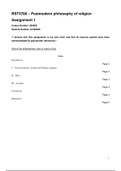RST3708 – Postmodern philosophy of religion
Assignment 1
Unique Number: 894859
Student Number: 61393495
“I declare that this assignment is my own work and that all sources quoted have been
acknowledged by appropriate references.”
God of the philosophers, who or what is God.
Index
Introduction
Page 2
I – Classical theism, Anselm and Thomas Aquinas
Page 2
II – Plato
Page 3
III - Aristotle
Page 3
Conclusion
Page 3
References
Page 5
1
, INTRO
The philosophy of religion takes nothing as a given, not even the existence of God. In philosophy we
need an argument to explain a certain believe. This is in stark contrast to theology, where not
believing in God is not an option. We will be discussing the existence of God through a philosophical
viewpoint and try to find an argument to prove the existence of God. Why is it important to find an
argument to prove the existence of a greater other or a God? Well our entire modern society has
been built around religious believes, religious believes and the existence of God has shaped the
course of human history and has been the biggest influence on human existence.
I
Classical theism or God according to classical philosophy emphasis that ‘God is everything’ and
highlights that God is not on a spectrum with humans. Humans are contingent beings (Any being
that could have not existed) and God is a necessary being (A being that has always existed, that
always will exist, and that can’t not exist).
11th century French monk, Anselm of Canterbury offered a deductive argument in support of believe
in God’s existence. He created the Ontological argument for the existence of God, “God is the
greatest thing we can think of, things we think of can be real or imaginary. Anything real is better
than something we can only imagine, If God is the greatest of all things we can imagine, the only
thing that could be greater is if God was real, therefore God must exist in reality if He is the greatest
thing we can think of.” (Crash course #10) This argument only works if you see God as a necessary
being.
An Italian philosopher Thomas Aquinas criticized the Ontological argument and said that one can
prove that anything you can imagine can exist by using such a deductive argument, but Anselm’s
argument only works if you see God as a necessary being. Aquinas gave five arguments for the
existence of God. His cosmological arguments are motion, causation, contingency and degree. If
infinite regress is a reality, that in any chain of reasoning there must have been a starting point, God
is the start of all motion that exist in the universe. That God was the starting point to causation and
caused everything in the universe to exist as it does. God must be the starting point if He is a
necessary being that existed always and can’t not exist. Lastly, he argues that God is the fist degree
at what we can measure goodness.
Further Aquinas defined the divine attributes that describe God, that God is an Omni-God. He is
omniscient, being all knowing. Omnipotent, being all powerful. Omnibenevolent, possessing perfect
goodness. Omnitemporal and omnipresent, being at all places and all times at once.
2




